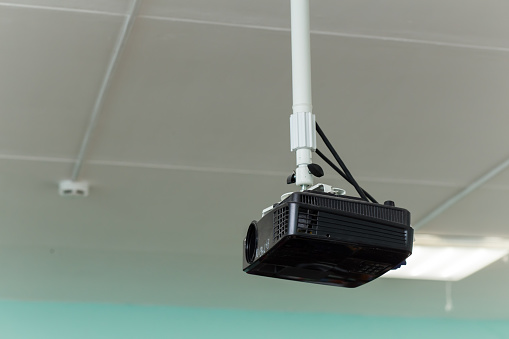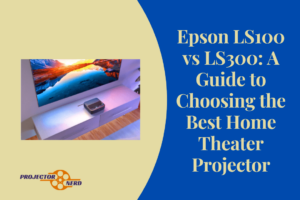Read about Gray Vs White Projector Screen here. Are you an avid movie buff? Have you outfitted a room just to screen movies and videos? Say you have just purchased a projector and are now in the market for a screen. What should you buy? Who wins the argument on grey vs white projector screens.
Contents
Gray vs white projector screen
While you do have to consider a few other aspects for a projector screen like the ratio of the screen and light gain, the other most important decision to make is whether you go for a white or a grey screen. You may have traditionally only come across white screens for projectors but in some conditions, a grey screen may be the thing that would suit your situation.

Considering that the price for both grey and white screens is by and large the same, you need to understand two other big factors that come into play – the actual specifications of your projector and the light and dark environment of the room where you will use your projector.
Gray vs White projector Screen – When do they Matter?
The debate for gray vs white projector screens only really came up after the first gray screen to be used in 2001. At the time, projectors in the market were not up to the mark with what’s available now. Specifically, projectors had poor contrast capabilities compared to technological advancements made since then in projectors now.
When you pit white screen vs a grey screen for projectors, you should know that a grey screen absorbs more ambient light than a white screen. So what happens is that blacks appear darker on grey screens than white screens when using the projector in a room that has not been blackened completely.
The contrast then appears better on grey screen in a room that has some level of environmental light present. Or else on a white screen in a room with some amount of ambient light, the blacks appear grey and the contrast in picture is lost. With advancements in projectors these days, this has been offset a bit with better projector contrast capabilities. But, the grey screen still makes a difference in a room that has some amount of light seeping in while using the projector.

But in a room that has been designed to be completely dark and void of ambient light, a white screen becomes superior to its grey counterpart. The picture quality is clearer on a white screen in a darkened room than on a grey screen. The colours projected are exactly how they were intended to be. So the white vs grey screen projector debate heavily depends on your actual projector machine and the room you intend to use it in.
What Screen Should You Buy?
If you have created a room just to screen your movies, where you have taken every precaution to make it the perfect screening room and your projector will be used only in that room, there is no question about it – Buy a white screen. If however, you are buying it, say, for official purposes where it needs to be carried around from place to place for presentations where you have little control over the settings of the room, you may be better off sticking to a grey screen.
FAQs
1. What’s the best way to clean my projector screen?
Use a microfiber cloth to wipe the screen and do not rub. When required use a very small amount of alcoholic solution on cotton bud to wipe more persistent stains.
2. What’s the best screen ratio to buy?
Most projectors are 16:9 that can fit onto a 16:9 or even a 2.35:1. So it shouldn’t be a very big concern.
3. At what height should the projector screen be mounted?
The centre of the projector screen must be in line with the eye level of the closest row for viewing. Then every subsequent row will also have a comfortable view of the screen.

I’m Steven Berry and I’m the proud owner of an electronics store. With years of experience in the industry, I’m passionate about providing top-quality projectors to customers who want to take their entertainment or business presentations to the next level. Browse my store and let me help you find the perfect projector for your needs.



